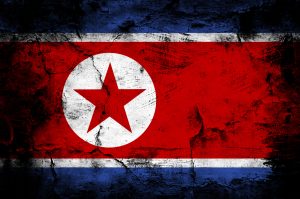North Korea conducted a strategic cruise missile launch on Thursday, according to Korean Central News Agency (KCNA).
“The four strategic cruise missiles precisely hit the preset target on the East Sea of Korea after traveling the 2,000km-long elliptical and eight-shaped flight orbits for 10,208s to 10,224s,” KCNA, North Korea’s main state-run media, said.
The North launched the missiles from the North Hamgyong Province and “reconfirmed the reliability of the weapons system,” KCNA added.
Thursday’s missile test came five days after the North launched its Hwasong-15 intercontinental ballistic missile (ICBM).
“The drill clearly demonstrated once again the war posture of the DPRK nuclear combat force bolstering up in every way its deadly nuclear counterattack capability against the hostile forces,” KCNA said. (DPRK is an acronym of the North’s official name: Democratic People’s Republic of Korea.)
South Korea’s Joint Chiefs of Staff, however, disputed at least part of KCNA’s account. “There is a difference between what South Korea-U.S. reconnaissance surveillance assets identified and what North Korea announced,” the JCS said in a statement, without specifying where the discrepancies were.
Unofficial statements to media outlets have questioned whether the launches took place at all. South Korean broadcaster MBC, citing an anonymous military source, reported that Seoul had not detected any missile launches or preparations for launches.
Analysts have previously warned against taking North Korea’s official descriptions of missile launches and performances at face value, since announcements in state-run media necessarily serve a propaganda purpose for Pyongyang.
Considering the timing of the North’s strategic cruise missile launch, it seems to be carried out as a corresponding measure against the South Korea-U.S. Deterrence Strategy Committee Table-Top Exercise (DSC TTX) that was held at the Pentagon on Wednesday. Although the DSC TTX was conducted in a computer simulation, North Korea reacted promptly as the exercise was mainly focused on the possible scenario of the North using nuclear weapons.
Prior to the exercise, a spokesperson from North Korea’s Foreign Ministry had threatened “unprecedentedly persistent and strong counteractions” to future South Korea-U.S. military drills.
Also, the United States and its allies held an emergency meeting at the United Nations Security Council on Monday to discuss the continuous nuclear and missile threats of North Korea. In response, Pyongyang again belittled the U.S. and the U.N. for attempting to violate its right to self-defense.
“If the UNSC has a true intention to contribute to peace and security in the Korean Peninsula, it will have to bitterly condemn the U.S. and South Korea for their moves of escalating military tension such as the frequent deployment of strategic assets and large-scale joint military drills against the DPRK,” Kwon Jong Gun, a director general of the Department of U.S. Affairs of the North’s Foreign Ministry, said.
Even though China and Russia, both permanent members of the UNSC, have vetoed the U.S.-led push to impose additional sanctions to punish the North’s missile launches, Kim conveyed Pyongyang’s dissatisfaction with the Security Council, which North Korea accuses of working for the interests of the U.S. and its allies.
“Availing ourselves of this opportunity, we remind the UNSC once again of our stand that if it puts the DPRK’s right to self-defense on the table again, being led by the U.S., the corresponding strong countermeasure will be taken.”
In the wake of Pyongyang’s unprecedented missile launches last year, the United States clearly stated in the 2022 National Defense Strategy that a nuclear attack from North Korea will be the end of the Kim regime. Seoul and Washington have demonstrated their pledges to strengthen the joint deterrence measures by extending their combined military drills this year.
However, as China and Russia are overlooking the North’s illicit missile developments, Pyongyang will keep exploiting the current security environment in the region to raise the ante for future negotiations with the United States.

































